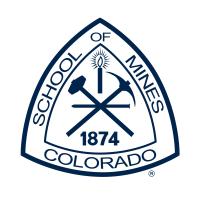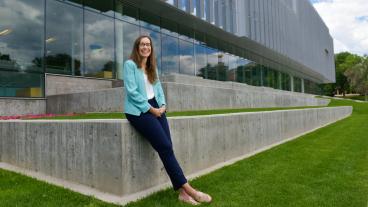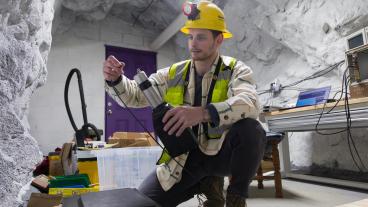Colorado's quantum hub will revolutionize technology, with Colorado School of Mines helping lead the way
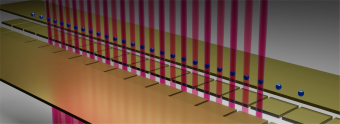
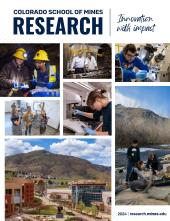
By Sarah Kuta, Special to Mines Research Magazine
For years, scientists have dreamed of making one-dimensional magnets, atom-sized materials that could revolutionize computer hard drives and other data storage devices.
A major hurdle? One-dimensional magnetic materials don’t exist in nature.
To get around this issue, Zhexuan Gong and other Mines researchers turned to a quantum simulator made of a particular experimental device that uses electrodes and lasers to trap charged atoms. By controlling the interactions among the trapped ions, Gong and his collaborators were able to create a brand-new synthetic quantum material—the world’s first 1D magnet, made of just 23 atoms.
“It’s a very cool demonstration of what we can do with these quantum systems,” said Gong, an associate professor of physics. “It’s really pushing the boundaries of how we can manipulate these really small microscopic systems at our wish.”
One-dimensional magnets still have a long way to go before they end up in your laptop. But this type of cutting-edge, making-the-impossible-possible research is just one example of Mines’ leadership in quantum information technology.
It’s also why Mines is a key player in Elevate Quantum, a regional consortium of 120 organizations in Colorado, New Mexico and Wyoming that aims to cement the Mountain West’s position as a global leader in the quantum field.
Already, the group is making big strides toward that goal. In October 2023, the U.S. Department of Commerce’s Economic Development Administration (EDA) selected Elevate Quantum from 198 applications to be one of its 31 inaugural Tech Hubs, or domestic regions with the potential to become globally competitive in “industries of the future.”
Less than a year later, the EDA awarded Elevate Quantum $40.5 million in federal funding, which unlocked $84 million in matching state support and millions of dollars’ worth of private capital.
The money will help launch new startups, upskill thousands of workers and establish a world-leading quantum lab in the Mountain West, among other initiatives. More broadly, it’s also a resounding endorsement of Colorado’s quantum prowess.
“The strongest quantum industry in the U.S. is already in Colorado and this now brings in New Mexico and Wyoming as strong partners in the development of a regional tech engine,” said Lincoln Carr, professor of physics and Mines’ representative to Elevate Quantum.
Research like Gong’s is also emblematic of the innovation the U.S. needs if it wants to remain competitive in quantum information technology on an international scale. This fast-growing sector is poised to affect everything from national security to the economy.
Right now, scientists around the world are racing to develop quantum sensors, quantum simulators, quantum computers and other novel devices that harness the unique properties of atoms and subatomic particles. Many of these technologies are still in their infancy, but once viable, they’ll be faster, more powerful and more energy-efficient than existing computers.
Experts predict quantum technologies will primarily be used for good—to help tackle major problems affecting human well-being, from developing new medicines to solving climate and energy challenges. But, in the wrong hands, they could also be used in more dangerous ways, such as decrypting sensitive information, disrupting the world’s flight network, modifying court records or jamming GPS signals, said Carr.
To promote the beneficial uses—and prevent the potentially harmful ones—the U.S. needs to remain at the forefront of this rapidly evolving field. That means not only growing the quantum workforce but also continuing to support scientists who are conducting groundbreaking research to push the field forward.
“There are so many problems we can solve with quantum technology—really hard scientific questions that just cannot be solved using traditional computers,” said Gong. “With quantum, it’s possible to break the boundaries of human knowledge.”

